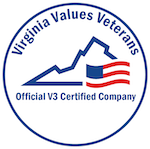Committed to Making a Difference!
WOSB Certified
Areas of Expertise
Training & Education

Training more than 450 students annually, Leffler Consulting has built a strong reputation as an acquisition workforce trainer within the Intelligence Community. Our veteran practitioners work closely with government leadership to educate a diverse group of government and industry professionals, including contracting officer’s technical representatives (COTRs), program managers, financial managers, technical managers, CLIN managers, and others involved in the acquisition process. Our instructors are subject matter experts who leverage their industry and government knowledge with lifetime experience to develop course curricula that focus on the following:
- Financial Management
- Program Management
- Risk Management
- Scheduling
- Cost Estimating
- Proposal Evaluation
- Statement of Works, Contracts and Incentives
- Appropriations Law
- Earned Value Management
- Acquisition Lessons Learned
Leffler instructors provide formal classroom instruction, video teleconference training, just-in-time training, and streamlined training on selected acquisition topics. Courses feature knowledge sharing lectures, exercises, case studies, and learning diagnostics that provide valuable insight into practical acquisition approaches and techniques. As law, policy, and technology evolve, we continually update course content to ensure students benefit from the most current information available.
Examples of our courses include:
- Contract Funds Status Report (CFSR) – provides the training necessary to support a working knowledge of the CFSR, which is the principle tool for obtaining contractor financial information. The in-depth analysis of data and its use in developing management decisions is communicated through exercises and case studies unique to this course.
We present a block-by-block description of the CFSR contract data requirements list (CDRL) and the CFSR data item description (DID) requirements, including the requirement to report most likely cost, adjusted fee, and termination liability. Exercises enable the students to learn how to validate financial execution data and verify funds run-out dates. Case studies require the participants to focus their attention on the financial information needs of management and to use the results of data analysis in making informed management decisions. - Cost Accumulation Policy (CAP) – defines how to separate investment costs from operating costs and provides the foundation to accurately identify work activities. Discussions and exercises are used to explain the assignment of the appropriate expenditure type (ET) and general ledger account code (GLAC) to budget line items (BLIs) and contract line item numbers (CLINs).
- Contractor Cost Proposal Evaluation – describes the responsibilities of the cost team and provides students with knowledge of cost proposal evaluation terminology and processes. Course describes the elements of cost, the relationship of the bases of estimate (BOEs) to the cost proposal and the difference between the most likely cost used in the competitive environment and the pre-negotiation position used in the sole source environment. Profit policy and tools to create a fee position are discussed and demonstrated.
- Earned Value Management (EVM) – provides the training necessary to impart a good working knowledge of project management best practices for managing non-level of effort, cost reimbursable contracts. An in-depth understanding of the intent of the 32 guidelines is provided in the categories of:
- Organization
- Planning, scheduling, and budgeting
- Accounting considerations
- Analysis and management reports
- Earned value methods and techniques
Earned value metrics are explained and demonstrated using a simulated project. A detailed discussion of the contract performance report (CPR) is provided, followed by a discussion and demonstration of how to reconcile a CPR to the contract funds status report (CFSR).
- “Just-In-Time” (JIT) Training – These courses are designed to meet the immediate needs of acquisition teams. Providing what is needed, when needed, and where needed, this training is customized to the requirements of the acquisition team. Program office teams request this training to support source selection activities, Integrated Baseline Reviews (IBRs), solicitation preparation, proposal evaluation, and various other milestone activities that they manage. Typically, modules from the formal courses are tailored to specific program needs and presented for selected participants.
What Students Are Saying
“Definitely worth my time. This course connected the dots for me as a budget officer.”
“I would recommend this class be a required course for all government and military personnel because subject matter relates to everything we do. I wish I had taken this course during my first six months at this agency.”
“The class gave me a better perspective of how we acquire funds and meet agency requirements.”
“Information was specific and answered potential activities that could derail an event or schedule.”
“Very thorough and really helped the team gain a better understanding of how IBRs are conducted.”
“It provided a great deal of information that is going to be useful in my current position. The knowledge base of each of the speakers helped to reinforce the topics covered in class.”
“Gave me a better understanding of how the funds were obtained & tracked by the agency and Congress.”
“The course was a good correlation between the academic purpose of an IBR and preparation for our actual IBR needs and activity.”


